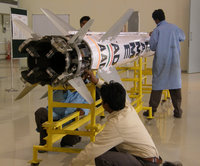Just a quick word on some military procurment items that have been in my browser for a couple days: India wants a handful of stealth frigates, and is trying to figure out whether to build the first couple tubs domestically (high risk of technical screwups eating away the cost benefits) or abroad (political landmine, but reverse technology bonanza). Meanwhile, Israel is still interested in the F-22 Raptor stealth fighters. Combined with Japan’s and Australia’s interest, as well as that of certain elements in the Pentagon in keeping the production lines moving, this might get a technology-transfer-proof model in the works. […]
India Archive
Free Newsletter

NEW DELHI — Two weeks ago, a ballistic missile blasted off from a warship sailing in the Bay of Bengal. Its target was Wheeler Island, a small enclave of land off the coast of India and home to one of India’s most important missile testing facilities. Within seconds of the launch, the Indian military’s radars and computer banks began tracking the supersonic rocket. Several computations later, an alarm triggered another “hot” missile on the island that, once launched, began pursuing the aggressor warhead. Some 70 kilometers above the earth’s surface, the two collided. The rocket’s debris fell through the sky, […]
After a series of disputes over export subsidies and trade barriers, China and India agreed to form a working group (via 2point6billion) that will meet every few months to discuss trade issues. Score one for responsible management of trade disputes. Protectionism is not an inevitable response to the economic downturn. Send in anything you see, I’ll flag it.
In his WPR column on Wednesday, David Axe discussed the budding American-Chinese naval rivalry in the South China Sea-Indian Ocean. He called particular attention to the role India plays in American plans to check China’s naval ambitions in the region. Interesting to note, then, that four days after the USNS Impeccable incident off of Hainan Island, the State Dept. informed Congress it would license the sale of eight Boeing P-8I long-range maritime reconnaissance aircraft to . . . drumroll, please . . . India. The $2.1 billion contract, which I flagged two months ago, is the largest U.S. weapons transfer […]

On March 8, five Chinese trawlers surrounded and harassed the USNS Impeccable, a civilian-crewed naval survey ship sailing in international waters on the South China Sea, resulting in a week-long diplomatic tiff. The Chinese government accused the ship of spying on its naval forces. Washington eventually admitted that was true, but insisted it had every right to do so. (See James Kraska’s WPR Briefing.) In the wake of the incident, both sides moved in reinforcements. The U.S. Navy sent a destroyer to escort Impeccable on future missions; Beijing deployed a patrol vessel to the area. Some pundits declared the confrontation […]
It seems like all roads lead to China here on the blog, at least yesterday and today. But among the seven points raised by Karl Inderfurth in Congressional testimony on U.S.-India relations, this one really warrants emphasizing: Sixth, promote a cooperative triangle. Along with themuch-improved U.S. -India relationship has come questions about theunderlying motivations for this new direction in American foreignpolicy, specifically whether it represents a hedge by Washingtonagainst a rising China, India’s most consequential neighbor. Thesemanipulative temptations should be resisted. Strengthened U.S. tieswith India have their own strategic logic and imperatives and shouldnot be part of a China containment […]
Even before the global financial crisis, I’d been pointing out the various possibilities for a globalization backlash. It seemed pretty likely that opposition to the enormous transfer of wealth from developed to developing countries would eventually be couched in regulatory concerns, whether social or environmental. The global downturn is likely to accelerate that process, and spread it to emerging-emerging commerce as well. As an illustration, India just relaxed a recent outright ban on Chinese toys, limiting it instead to products not covered by global certification agencies. That provides the necessary cover for now. But while all economists are voters, not […]
